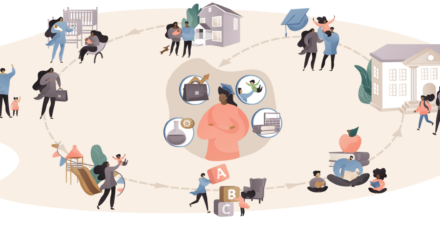Equitable Growth supports research and policy analysis on how unequal access to care, 21st century work-life policies, and education undermines stable, broad-based economic growth.
Photo credit: Yuttana Contributor Studio/shutterstock.com
Just as investment in physical capital is an important driver of economic growth, investment in human capital is key to the health of the economy as a whole, as well as family wellbeing. Equitable Growth supports research to better understand how unequal access to supportive environments, quality education, and other human capital development opportunities not only drives unequal outcomes for families but also undermines future economic growth.
Featured Research
In Conversation with Omari Swinton
September 24, 2025
September 24, 2025
Factsheet: What we know about the federal employer-provided child care credit and how can it be better used by businesses
April 22, 2025
April 22, 2025
What the minimum wage can tell us about the future of the U.S. child care system
November 1, 2023
November 1, 2023
Factsheet: What the research says about the economics of the 2021 enhanced Child Tax Credit
November 29, 2022
November 29, 2022
Factsheet: What the research says about the economic impacts of reproductive care
June 27, 2022
June 27, 2022
Explore Content in Families1045
Request for Proposals: The economic effects of the Inflation Reduction Act
April 2, 2025
April 2, 2025
The U.S. House of Representatives’ budget resolution threatens social infrastructure programs, putting families’ well-being at risk
March 10, 2025
March 10, 2025
Testimony by Michael Linden House Oversight Subcommittee on Healthcare and Financial Services
February 11, 2025
February 11, 2025
Recent research shows how paid leave impacts women’s employment and financial security in the United States
December 13, 2024
December 13, 2024
New research highlights the impact of COVID-era unconditional cash benefits for U.S. workers and families
December 10, 2024
December 10, 2024
Request for Proposals: Promoting competition and supporting workers in an era of AI innovation
November 20, 2024
November 20, 2024
Request for proposals: Research grants for early career scholars
October 30, 2024
October 30, 2024
In Conversation with Mishaela Durán
September 12, 2024
September 12, 2024
The Highway to Displacement: Interstate 10 and Black Communities in New Orleans
August 27, 2024
August 27, 2024
Big Daycare: The Impact of Private Equity-Owned Child Care Businesses on the Market for Early Care and Education
August 27, 2024
August 27, 2024
Experts on the issue
Explore the Equitable Growth network of experts around the country and get answers to today's most pressing questions!





















